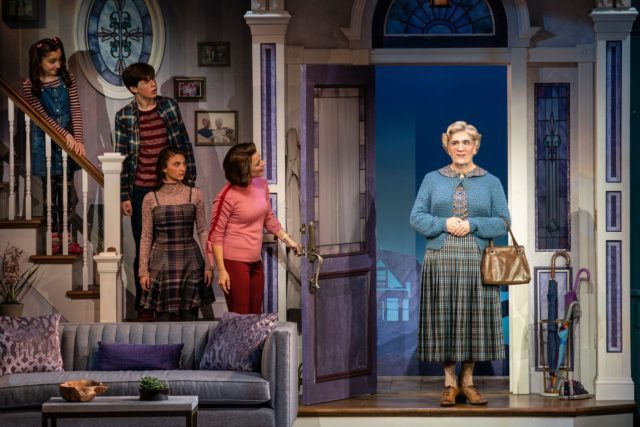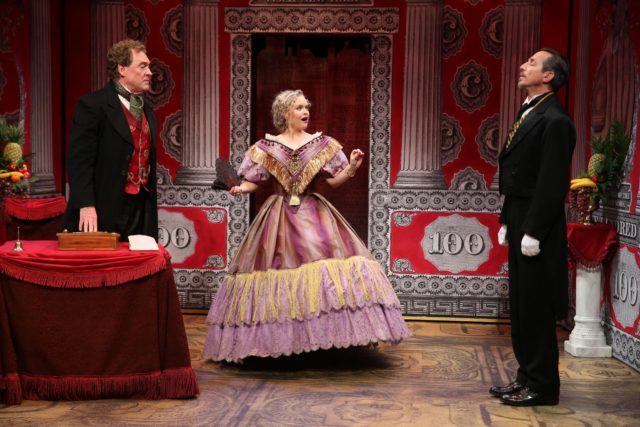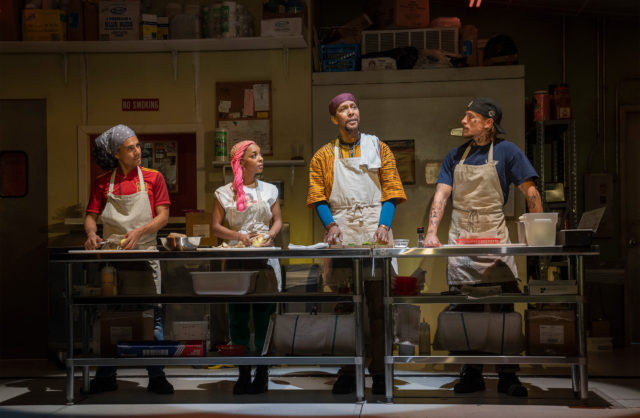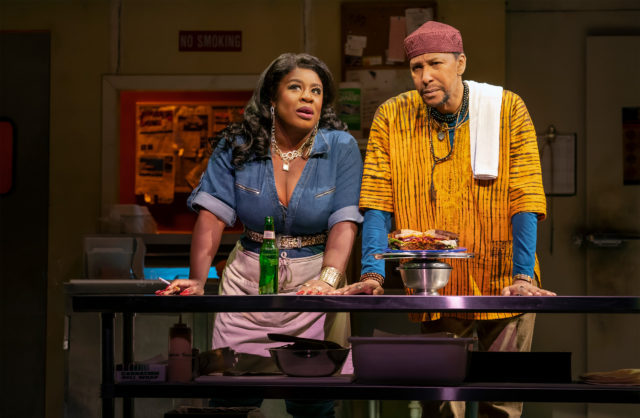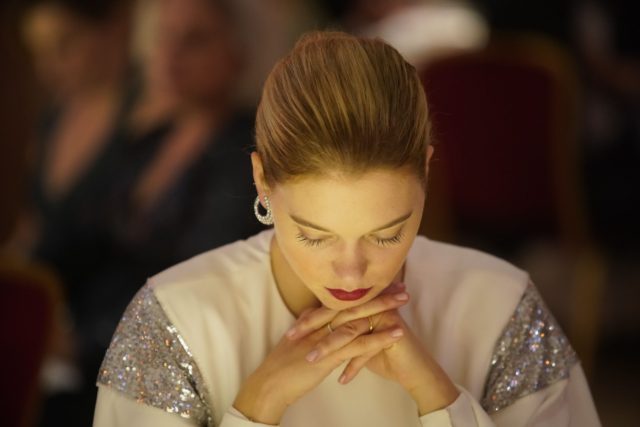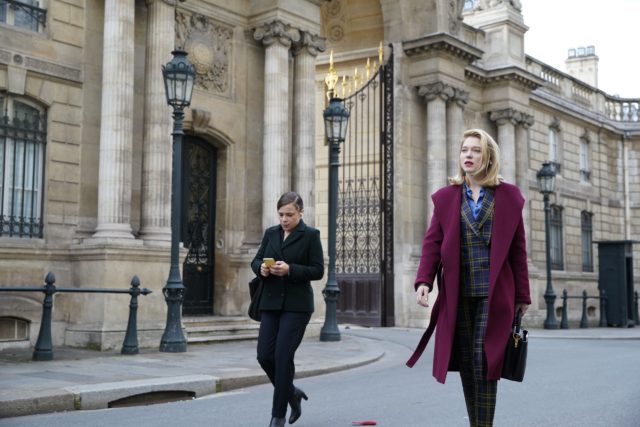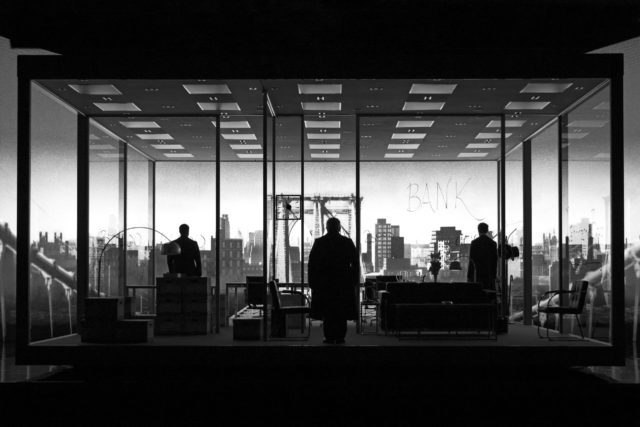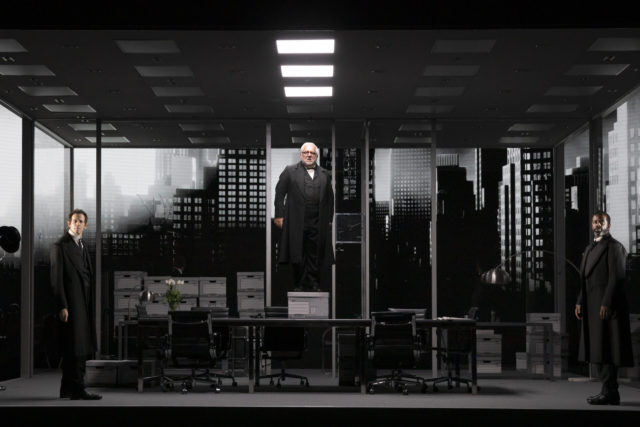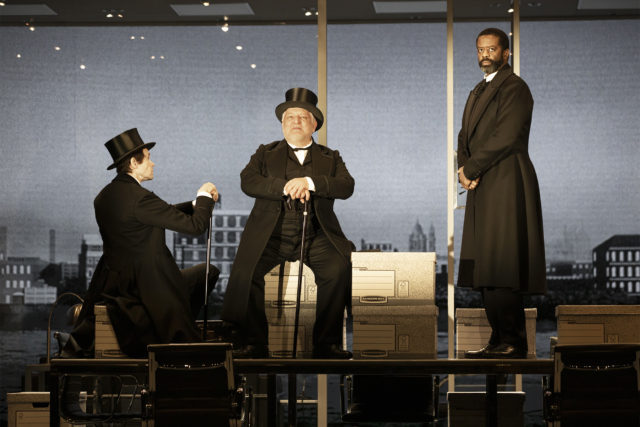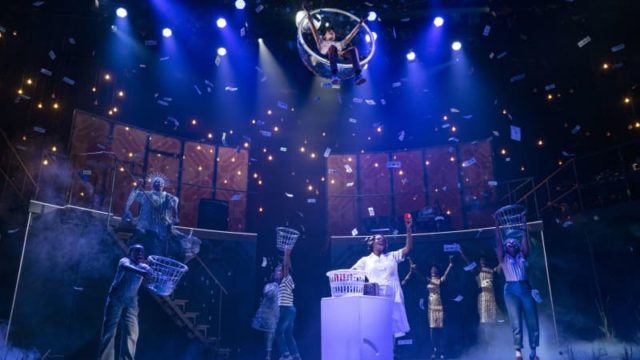
Caroline, or Change returns to Broadway in marvelous revival at Studio 54 (photo by Joan Marcus)
CAROLINE, OR CHANGE
Studio 54
254 West 54th St. between Eighth & Ninth Aves.
Tuesday – Sunday through January 9, $49-$250
212-719-1300
www.roundabouttheatre.org
A few days before seeing Michael Longhurst’s Broadway revival of Caroline, or Change at Studio 54, I was at another theater waiting for a play to begin when the two men next to me started talking about the show, saying that friends of theirs considered it the best musical of the young century. Who am I to disagree?
I was sucked in from the opening moments, when Black maid Caroline Thibodeaux, spectacularly portrayed by Sharon D Clarke, is downstairs in the basement of the Gellman home in Lake Charles, Louisiana, in late 1963. She’s doing the laundry and listening to the radio, explaining, “Nothing ever happen under ground in Louisiana / Cause they ain’t no under ground in Louisiana / There is only under water.” She is joined by the Washing Machine (Arica Jackson, in a bubbly costume), who tells her, “Consequences unforeseen. / Consequences unforeseen. / Put your faith and clothes in me, / a brand-new nineteen-sixty-three / seven-cycle wash machine,” and the Radio (a 1960s-style girl group consisting of Nasia Thomas, Nya, and Harper Miles in matching sparkling outfits and antennae), who agree, “Tough and dreary and all dishevel, / sixteen feet below sea level.” The demonic Dryer (a devilish Kevin S. McAllister) declares, “Laundry mine now! / You know the story: / Let’s make this basement a purgatory. / Time has come / Time has come / Time has come to suffer heat!”
Caroline is an unhappy single mother raising four kids on the thirty dollars a week she makes working tirelessly for the Gellmans, who are Jewish: The recently widowed Stuart Gellman (John Cariani), who prefers to play the clarinet rather than to say much or face reality; his new wife, Rose Stopnick Gellman (Caissie Levy), who can’t help feeling like an unloved replacement for the deceased, beloved Betty and who misses her old Upper West Side neighborhood; and Stuart’s eight-year-old son, Noah (alternately played by Gabriel Amoroso, Adam Makké, or Jaden Myles Waldman), who has developed a secret relationship with Caroline. He goes down to the basement to hang out with her, lighting her cigarettes and watching her work, even though, as she tells him, “I got no use for you. This basement too darn hot for two.”
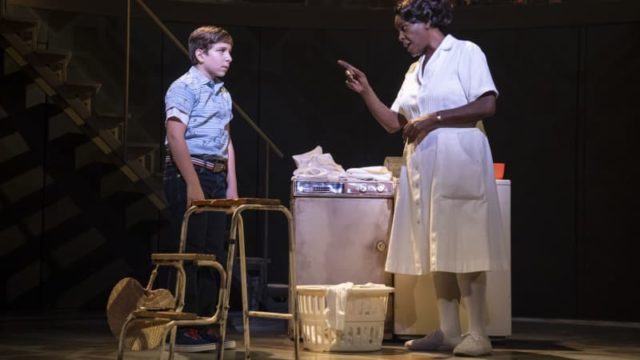
Maid Caroline Thibodeaux (Sharon D Clarke) has some sharp words for Noah Gellman (Adam Makké) in poignant, prescient show (photo by Joan Marcus)
When Rose catches Noah leaving change in his pocket yet again, she chastises him and decides to let Caroline keep whatever she finds, to both punish Noah and supplement Caroline’s meager wages. But Caroline does not want any charity, instead collecting the money in a bleach cup and returning it to the boy — until she doesn’t, and things take a sharp turn.
Pulitzer and Tony-winning book writer Tony Kushner (Angels in America, Homebody / Kabul) references change in many ways throughout the show’s one hundred and fifty minutes (with intermission). As Caroline, three-time Olivier winner Clarke (Death of a Salesman, The Amen Corner) carries the weight of 1960s racism and inequality on her shoulders; Caroline is thirty-nine, while Clarke is fifty-five, and it’s easy to believe that the constant wear and tear on Caroline’s daily existence has aged her unfairly.
She is deeply unsatisfied with her position in life but also feels that there is no way out, that she has no choice but to play the role of the lowly black maid. While waiting for the bus (McAllister) with fellow maid Dotty Moffett (Tamika Lawrence), who is going to night school to better herself, Caroline says, “I don’t like the way you do. You change.” Dotty responds, “You the one that change! . . . Sorry you is sick and shame. Sorry you drinking misery tea. Sorry your life ain’t what it should be.”
As they continue to talk, the Moon (N’Kenge, in a dazzling round seat dangling from the rafters), a celestial presence watching from above, finally appears, promising, “Change come fast and change come slow / but change come, Caroline Thibodeaux.” Caroline replies, “Nothing ever changes under ground in Louisiana.”
At the Gellmans’ Chanukah party where Caroline, her sixteen-year-old daughter, Emmie (Samantha Williams), and Dotty are preparing dinner, Rose’s father, the progressive Mr. Stopnick (a scene-stealing Chip Zien), shouts, “The old world’s ending! Negroes marching! Change is coming! Down with the filthy capitalist chazzerim!” But Stuart’s parents (Joy Hermalyn and Stuart Zagnit) are having none of that, pleading, “Let’s not dwell on ugly things! Let’s thank God for the joys He brings! Watch the colored candles melt! Spin the dreidel for Chanukah gelt!”
During Chanukah, children often receive chocolate gelt, shaped like change: nickels, dimes, quarters, and half-dollars. Earlier, when Caroline is considering keeping the money Noah has been leaving in his pocket, she opines that her ten-year-old son, Jackie (Alexander Bello or Richard Alexander Phillips), has to see the dentist, her eight-year-old son, Joe (Jayden Theophile), wants candy, and her oldest son, Larry, who is fighting in Vietnam, needs a care package with cookies. Chanukah gelt, both real and confectionary, is not going to solve their problems.
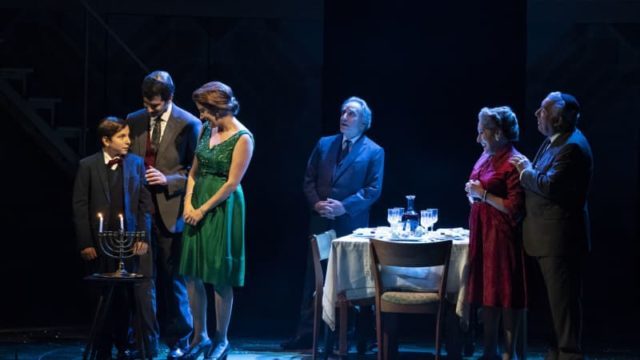
A Chanukah party leads to trouble in Caroline, or Change (photo by Joan Marcus)
The outstanding score by Tony-winning composer Jeanine Tesori (Fun Home, Thoroughly Modern Millie), who previously teamed up with Kushner on the opera A Blizzard on Marblehead Neck for Glimmerglass, ranges from R&B, soul, and gospel to blues, klezmer, and folk, with orchestrations by Rick Bassett and Buryl Red that avoid treacly sentimentality. The multilevel set, by Fly Davis, who also designed the costumes, sometimes separates into two parts, creating a gap between Noah’s upstairs bedroom and the other half of the house, but the space it creates is often confusing and uncomfortable. However, the depiction of the washer/dryer and radio is hilarious, their playful movement choreographed by Ann Yee.
Longhurst (Constellations, Europe) keeps the action proceeding at an exciting pace that does not allow pauses for applause after songs, which works beautifully, although the audience can’t help but shower praise on Clarke after a showstopping solo in which Caroline finally asserts herself, proclaiming, “Ya’ll can’t do what I can do / ya’ll strong but you ain’t strong like me.”
Seventeen years after its debut, the semiautobiographical Caroline, or Change is both prescient and timely. Kushner — who grew up in a Jewish family in Lake Charles, with a father who played the clarinet, a mother who had cancer (but did not pass away when he was a child), and a Black maid named Maudie Lee Davis to whom the show is dedicated — makes references to the Spanish flu and a Confederate statue being torn down, and the repeated refrains about being underwater came just before Katrina struck Louisiana in 2005. The Covid-19 crisis and murder of George Floyd brought racial injustice and inequity to the forefront of America yet again, recalling the 1960s civil rights movement.
Caroline, or Change doesn’t provide any easy answers or celebrate any heroes; it is instead a potent reminder that while things have changed over the last sixty years, a whole lot more still needs to change. The best new musical of the twenty-first century? Who am I to disagree?




